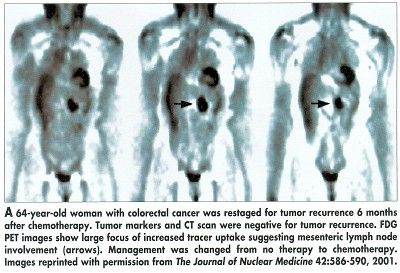FDG PET Affects Management of Colorectal Cancer Patients
LOS ANGELES-Positron emission tomography (PET) changed the disease management of more than 60% of patients with colorectal cancer, according to a survey of referring physicians. The most striking change occurred among patients for whom surgery was the intended treatment: 41% of these patients had their treatment changed from surgery to medical treatment. Another 13.5% saw the surgical approach changed as a result of the PET findings.
LOS ANGELESPositron emission tomography (PET) changed the disease management of more than 60% of patients with colorectal cancer, according to a survey of referring physicians. The most striking change occurred among patients for whom surgery was the intended treatment: 41% of these patients had their treatment changed from surgery to medical treatment. Another 13.5% saw the surgical approach changed as a result of the PET findings.

The survey was designed to look at the effects of whole-body PET imaging in a typical clinical setting, said investigator Johannes Czernin, MD, and his colleagues at the Ahmanson Biological Imaging Clinic/Nuclear Medicine, UCLA School of Medicine, and the Northern California PET Imaging Center, Sacramento.
Between October 1998 and January 2000, the researchers contacted 95 physicians who referred 146 colorectal cancer patients to their facilities for whole-body FDG PET. Pre-PET and post-PET questionnaires were sent for each referred patient, and 60 responses were obtained.
FDG PET was ordered for more accurate staging in 55% of cases, for monitoring of the disease course in 23%, for more accurate diagnosis in 12%, for monitoring therapy in 2%, and for a combination of these reasons in 5%. The remaining 3% reported other reasons for ordering the scan.
As a result of the PET scan findings, referring physicians changed the type of treatment for 36.7% of their patients: From surgery to medical treatment (11.7%), combined radiation therapy and medical treatment (1.7%), or no treatment (3.3%); from no treatment to surgery (8.3%), medical treatment (3.3%), or radiation therapy (1.7%); and from medical treatment to surgery (3.3%) or no treatment (3.3%).
Even when the type of treatment was not affected, the PET scans resulted in a change in the planned care for 18% of the patients: 6.5% had a change in surgical approach, 6.5% had a change in medical approach, and 5% had a change in both medical and surgical approaches.
PET findings contributed to a combination of management changes in 7% of patients. Two patients (3%) had other management changes, and the physicians of two patients (3%) did not respond to the question on change in management. There was no change in management based on PET scans in 32% of patients.
Changes in Clinical Stage
In addition to the change in clinical management, the physicians reported that the PET scan had changed the clinical stage for 25 patients (42%): 20 (80%) were upstaged and 5 (20%) were downstaged.
"This survey is important because it shows how PET, in real-life patient care situations, has a profound impact on the actual practice of medicine and, particularly, on the lives of people with colorectal cancer," said Dr. Czernin, of the Department of Molecular and Medical Pharmacology, UCLA.